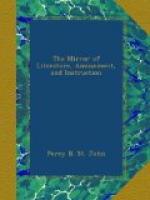Mr. Irving’s works, with the exception of his early efforts,[3] had been the result of his love of travel: indeed, he describes himself as a traveller who has “surveyed most of the terrestrial angles of the globe.” In similar vein, he next produced two volumes of “Tales of a Traveller,” narrating legends of the continent, with masterly sketches of the scenery of the respective countries; the incidents of the Tales being fraught with points of grotesque humour, and abounding with pathos and poetic feeling.
[Footnote 3: Among Mr. Irving’s early effusions are Lines written on the Falls of the River Pasaic which are not printed in the author’s works, but will be found in The Mirror, vol. ii. p. 452.]
To these Tales succeeded a work of greater importance in literature than either of Mr. Irving’s previous undertakings. We allude to a History of the Life and Voyages of Columbus, in four vols. 8vo., which appeared in the year 1828. Mr. Irving, at the time this work was first suggested to him, in the winter of 1825-6, was at Bordeaux; and, being informed that a biography was about to appear at Madrid, containing many important and some new documents relative to Columbus, he set off for the Spanish capital, to undertake the translation of the work. Mr. Irving, however, meeting with numerous aids at Madrid, resolved on producing an original history, which he has presented to the public with extreme diffidence: “all that I can safely claim,” he observes, “is, an earnest desire to state the truth, an absence from prejudices respecting the nations mentioned in my history, a strong interest in my subject, and a zeal to make up by assiduity for many deficiencies of which I am conscious.” This work has been abridged by Mr. Irving to one of the volumes of the Family Library. As we have intimated to the reader, it is of higher pretensions than either of the author’s previous writings: a clever critic refers to it as “a spirited and interesting work, in which every thing is as judiciously reasoned as it is beautifully and forcibly expressed,” and as “much more grave in its character and laborious in its execution than any of his preceding ones."[4]
[Footnote 4: New Monthly Magazine.]
Mr. Irving’s next production was “A Chronicle of the Conquest of Granada,” in which the author’s knowledge of Spanish history is made to shine in detailing the chivalrous glories of the New World.
In the spring of the present year it appears that Mr. Irving touched “the golden shores of old romance,” and published Tales of the Alhambra; the origin of which work is thus told by the author. A few years since, Mr. Wilkie, the distinguished R.A. and Mr. Irving were fellow travellers on the continent. In their rambles about some of the old cities of Spain, they were struck with scenes and incidents which reminded them of passages in the Arabian Nights. Mr. Wilkie urged his companion to write something that should




